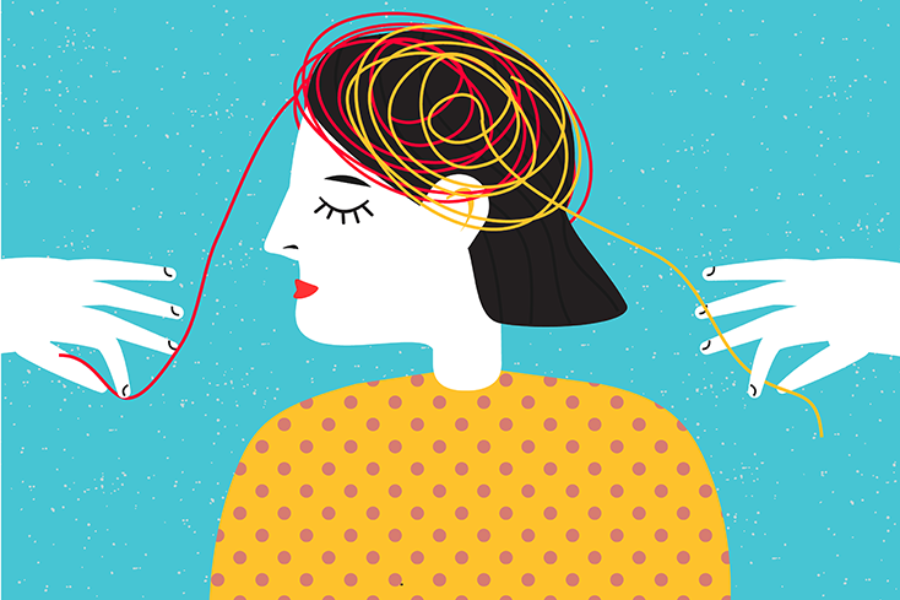My roommate’s wailing put me to sleep that night. Yeah, right. I wished it could, just like a real lullaby. Instead, I turned over and pulled the thin covers over my head, trying to forget what left me in a plastic bed in the first place. Even worse, this was not my first rodeo, meaning not my first psych hospital. It was my fourth. No, fifth. No, wait… I lost count.
This is what it’s like living with a mental illness; on top of all my symptoms, I have memory loss, which makes me feel like I’ve aged about 30 years (which, in turn makes me even more depressed). And I’m just a college student — one who really, really needed a vacation. I came to call my hospitalizations “grippy sock vacations.”
So here I was on a plastic bed with paper thin sheets, freezing, with the lights still on at maybe 1 a.m. Time operates differently in the psych ward because you have to find a clock somewhere in the hallway if you want to know the time and figure out, if you’re lucky, what day it is. Some places don’t give you the luxury of knowing the date.
My roommate was still crying, and I didn’t blame her. Then she started screaming to be taken to a hospital because “something is wrong with the baby” — and well, she was not pregnant. The nurse came in and tried to calm her down. The who situation was sad, but by this point, I was so unsettled by what my roommate was yelling that I got up and insisted to sign myself out. I was there voluntarily, so it should have been easy, right?
As it turns out, leaving wasn’t that simple.
Note to self: read the fine print. The paper that I signed meant that I was placed on a 24-hour hold until the doctor could talk to me the next day. I hadn’t been prepared for the realities of life inside a hospital. I never had conversations about hospitalization and inpatient treatment — it simply wasn’t something anyone I knew talked about.
Ultimately, my protests were fruitless, and I had to return to same room I was trying to avoid, where sleep would be impossible for the night.
The Reality Of My Two-Week Stay
When the doctor saw me the next day, he said he would “take it to court” unless I stayed the number of days they were suggesting: 14. A whole two weeks? How was a college student, part-time nanny and dog mom supposed to be away from her life for that long? The amount of homework I would have to catch up on already had my head spinning, and this hospitalization, intended to ease some of this stress, was making the spinning worse. In the past, my stay had always been a week at most. With a two-week stay, I felt sure that the experience would just add to my trauma.
A few days later, I found myself in my dull, nude-colored pair of grippy socks, walking in a straight line to the cafeteria (talk about a flashback to elementary school, minus the fact that we’d probably get reprimanded if we showed up to school in socks). People in front of me were talking about the latest gossip. In this case, a fight had broken out. And not some small petty middle school fight — like an actual, scary, physical fight. In fact, I did remember hearing all the yelling from the staff once the alarm went off.
Later, I found out that it was my new roommate (they moved me into a different room) who had started the fight. I didn’t even notice my roommate had left that morning. I guess I thought that she was still sleeping and didn’t really pay that much attention. Mental illness, I’ve found, does this thing where the days pass, and everything seems to be displaced or not quite right — like accidentally putting face cream on a toothbrush, thinking it’s your toothpaste. That’s how every day feels.
We made our way to the cafeteria like all the elementary school kids in America — same schedule, same routine. It was the hospital’s way of teaching us that a routine will take part in curing depression and will make life so much easier. It’s easy to believe them until you find yourself right back at the same psych hospital where you began.
I was minding my own business, making small talk with some people I had become acquainted with, when I looked up to see something sail through the air. I think it was a biscuit. There was a bunch of yelling, and honestly, I couldn’t even tell what was going on. But I knew that a fight was about to break out. I’m more of an introvert, so I sank lower in my chair and pretended that I wasn’t there.
A Conversation We Need To Have
I’ve noticed a metaphorical grey cloud that appears over someone’s head when they start talking about life in a psych ward. I can almost guarantee that the subject makes people uncomfortable — even scaring some. Talking about mental illness and mental health is one thing, but when you mention the hospital, the room goes completely silent, as if someone just said something they were not supposed to. It may not be the cheeriest of topics, but it is still an important one because it is real.
Although hospitalizations for mental illness have come a long way from early days of abuse and neglect, there is still a lot that needs to be done. My most recent “grippy sock vacation” came with some valuable lessons.
Perhaps the most obvious lesson is recognizing that life is challenging; that everyone has a story and that the psych hospital, although not perfect, is an opportunity to get the treatment you need to return to the “real world.” However, this experience also taught me that patients need to be heard, particularly when they ask for improvements to their living conditions and care. And the hospital is a good place to practice how to advocate for yourself, not with physical fighting or by hiding under a table, but by calmly having a conversation, repeating your needs and making sure someone hears you. This how I got out of the hospital in 10 days, rather than the full two weeks.
Lastly, I learned the importance of community and a support system, because in the hospital, many of the patients understood me in a way the outside world did not.
Janna Herron is the author of “Transforming Tears,” found on www.jannaherron.com with other works in the making, hoping to use her writing to make a difference and share creativity. She is finishing studies in English and music at Texas Woman’s University and plans to further her education after graduation.
Source: https://nami.org/Blogs/NAMI-Blog/April-2023/What-No-One-Told-Me-About-Being-in-a-Psych-Hospital




